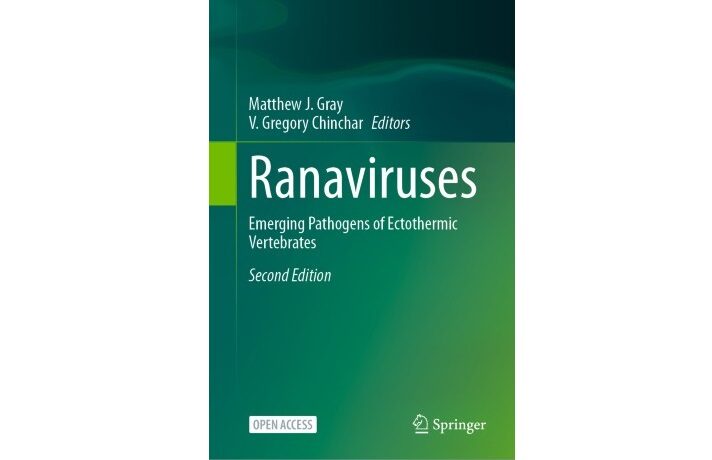
UT Professor Edits New Edition on Ranavirus Infection and Disease
KNOXVILLE, Tenn. – Researchers are providing new information and guidance on monitoring and managing viruses that cause life-threatening diseases in amphibians, reptiles and fish, as detailed in the second edition of Ranaviruses: Emerging Pathogens of Ectothermic Vertebrates. The new book is edited by Matt Gray, associate director of the University of Tennessee Institute of Agriculture Center for Wildlife Health and professor in the School of Natural Resources, and V. Gregory Chinchar, a professor emeritus at the University of Mississippi Medical Center.
Ranavirus infections result in mass die-offs of both wild and captive populations of amphibians, reptiles and fish around the world affecting biodiversity and ecosystems. Cases of infection or disease have been confirmed in at least 177 amphibian species, 49 fish species and 37 reptile species.
The second edition looks at how the viruses function in infected animals, transmission through host populations, the impact of international trade on global distribution, and diagnosis and surveillance for the viruses. New information is included, such as R code, to help readers with statistical analyses and modeling. A new chapter also focuses on Singapore Grouper Iridovirus written by scientists in China.
The second edition was the effort of 34 professionals from around the globe, including Deb Miller, director of the UTIA Center for Wildlife Health and UT One Health and a professor in the School of Natural Resources. Gray says, “The revision would not be possible without the organizing influence of the Global Ranavirus Consortium.”
The book is available as an open access publication on SpringerLink and was supported by the UT Open Publishing Support Fund, UT School of Natural Resources and the UTIA Center for Wildlife Health. The first edition of Ranaviruses is also available online.
The UT School of Natural Resources is part of the Herbert College of Agriculture, UT AgResearch and UT Extension at the University of Tennessee Institute of Agriculture. The curricula focus on a mastery learning approach, emphasizing practical, hands-on experiences. The School’s faculty, staff and students conduct research and outreach that advances the science and sustainable management of our natural resources. For more information, visit naturalresources.tennessee.edu.
The University of Tennessee Institute of Agriculture is comprised of the Herbert College of Agriculture, UT College of Veterinary Medicine, UT AgResearch and UT Extension. Through its land-grant mission of teaching, research and outreach, the Institute touches lives and provides Real. Life. Solutions. to Tennesseans and beyond. utia.tennessee.edu.